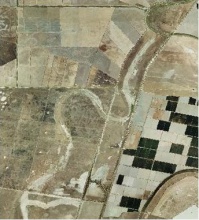Case study:Recovery "CañoTravieso": Difference between revisions
No edit summary |
No edit summary |
||
| (2 intermediate revisions by the same user not shown) | |||
| Line 23: | Line 23: | ||
*Establish a system for evaluation and monitoring to enable a critical assessment of compliance with the plan and promote a research agenda and a specific line of disclosure, dissemination and presentation of results. | *Establish a system for evaluation and monitoring to enable a critical assessment of compliance with the plan and promote a research agenda and a specific line of disclosure, dissemination and presentation of results. | ||
*Temporarily prevent the incorporation into the marsh of contaminated water or sediments, whereas such a risk. It is also necessary to prevent such waters can be incorporated into water systems or made available to any user. | *Temporarily prevent the incorporation into the marsh of contaminated water or sediments, whereas such a risk. It is also necessary to prevent such waters can be incorporated into water systems or made available to any user. | ||
Works included: Retrieving the original layout of the Travieso and morphology of the marshes. | |||
}} | }} | ||
{{Image gallery}} | {{Image gallery}} | ||
| Line 187: | Line 189: | ||
}} | }} | ||
{{Measures | {{Measures | ||
|Floodplain / River corridor=Habitat restoration, | |||
|Planform / Channel pattern=Modification or removal of existing defenses, Channel naturalisation, Improvement of channel morphology, | |||
|Management interventions=Environmental restoration of the area integral transformed by agriculture | |||
|Floodplain / River corridor= | |||
|Planform / Channel pattern= | |||
|Management interventions= | |||
}} | }} | ||
{{Hydromorphological_quality_elements_header}} | {{Hydromorphological_quality_elements_header}} | ||
Latest revision as of 10:19, 5 June 2017
Project overview
| Status | Complete |
|---|---|
| Project web site | |
| Themes | Environmental flows and water resources, Monitoring, Water quality |
| Country | Spain |
| Main contact forename | MARM |
| Main contact surname | MARM |
| Main contact user ID | |
| Contact organisation | MARM |
| Contact organisation web site | |
| Partner organisations | |
| Parent multi-site project | |
| This is a parent project encompassing the following projects |
No |
Project summary
The project "Doñana 2005" aims to restore and rehabilitate the complex hydraulics of the marsh, allowing the system to evolve with the highest degree of naturalness and freedom possible within the constraints of the environment of social, economic, administrative, technical, cultural, etc.
There are some actuations included in this project: Route water: environmental restoration project for tourist use; Restoration of the marsh "Gallega"; Control and permeabilization of the marsh to the river, the Brazo de la Torre and Entremuros; Restoration of streams Chico Soto, Soto Grande and Arroyo de la Laguna de los Reyes; Restoration of the stream of the Partido; Recovery of the functionality of Brazo de la Torre; and Recovery Caño Travieso.
The main objectives are:
- Restore water inputs to the marsh, in quantity and quality needed to restore the water dynamics of the marsh itself Doñana.
- To maintain, without interruption, the permeability between the marsh of Doñana and the Guadalquivir River estuary ensuring the incorporation of flows.
- Establish a system for evaluation and monitoring to enable a critical assessment of compliance with the plan and promote a research agenda and a specific line of disclosure, dissemination and presentation of results.
- Temporarily prevent the incorporation into the marsh of contaminated water or sediments, whereas such a risk. It is also necessary to prevent such waters can be incorporated into water systems or made available to any user.
Works included: Retrieving the original layout of the Travieso and morphology of the marshes.
Monitoring surveys and results
Lessons learnt
Image gallery
|
Catchment and subcatchmentSelect a catchment/subcatchment
Catchment
Subcatchment
Other case studies in this subcatchment: Control and permeabilization of the marsh to the river, the Brazo de la Torre and Entremuros, Guadiamar Green Corridor Project, Recovery "CañoTravieso", Recovery of the functionality of Brazo de la Torre, Restoration of streams Chico Soto, Soto Grande and Arroyo de la Laguna de los Reyes, Restoration of the stream of the Partido
Site
Project background
Cost for project phases
Reasons for river restoration
Measures
MonitoringHydromorphological quality elements
Biological quality elements
Physico-chemical quality elements
Any other monitoring, e.g. social, economic
Monitoring documents
Additional documents and videos
Additional links and references
Supplementary InformationEdit Supplementary Information
| ||||||||||||||||||||||||||||||||||||||||||||||||||||||||||||||||||||||||||||||||||||||||||||||||||||||||||||||||||||||||||||||||||||||||||||||||||||||||||||||||||||||||||||||||||||||||||||||||||||||||





